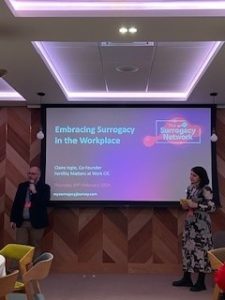1 March 2024
Louisa Ghevaert had the pleasure of networking with colleagues and professionals at The Surrogacy Network’s latest event in London on Thursday 29 February 2024. The focus of the meeting was “Embracing Surrogacy in the Workplace” with a really insightful presentation from Claire Ingle from Fertility Matters at Work.
Images: Claire Ingle, Co-Founder Fertility Matters at Work, Robert Gilmour, Partner at SKO Family Law Specialist, Jenny Carter, Debenhams Ottaway LLP. Louisa Ghevaert, CEO & Founder Louisa Ghevaert Associates
There is currently no statutory right to time off work for appointments for fertility treatment. Legal protection only applies from the point at which a person has an embryo implanted and they are classed as pregnant. There is also still a fundamental lack of recognition and understanding amongst organisations and employers about the demands and realities of undertaking fertility treatment in the workplace. Added to this, there is an absence of research looking at the impact of fertility treatment at work and in life. This continues to make it difficult to persuade employers to provide the necessary support for employees. As a result, this creates all sort of difficulties for employees in practice leading to demotions and sideways moves at work, resignations, redundancy, mental health problems and PTSD and a gender pay gap.
Lack of support for fertility patients in the workplace also continues to have a significant financial impact on employees. Firstly, they are not able to access paid time off work to attend fertility treatment appointments (often resulting in people taking valuable annual leave or taking sick leave). Added to this, they are burdened with paying privately for fertility treatment when they fail to qualify for IVF treatment funded by the NHS, as well as the costs of surrogacy. Since multiple fertility treatment attempts can often be needed, this can result in significant costs burdening employees with debts, reduced standard of living and inability to afford things like a holiday for some rest and recuperation.
Images: Louisa Ghevaert, CEO & Founder Louisa Ghevaert Associates, Natalie Sutherland, Burgess Mee Family Law, Claire Ingle, Co-Founder Fertility Matters at Work
There is therefore still much work to be done to ensure organisations and employers recognise fertility treatment, assisted conception and surrogacy as a life event needing support. It gave real pause for thought to hear that only 2% of companies currently have a fertility policy in place. The statistics around employee experiences of undertaking fertility treatment in the workplace were also really sobering: 36% had considered leaving their job, 69.5% were taking sick leave during treatment (as there’s no statutory right to time off work for this), 74% said fertility wasn’t recognised or valued by their employer, 93% said it had impacted their career, 90% reported feeling depressed and 61% didn’t feel comfortable talking to their employer about this and 42% had no idea who to turn to for support at work. This needs to change.
Working from home and flexible working (hybrid office/working from home) can make life easier for employees undertaking fertility treatment. This can give them greater flexibility about fertility treatment appointments. It means they can inject in the privacy of their own home, rather than say in their office toilet or car. It also means they can store their medications safely at home, rather than worrying about them in the office fridge. Furthermore, it affords greater privacy to make telephone calls to arrange treatment or receive difficult news when a cycle has failed or they receive disappointing fertility test results. It can also make it easier to coordinate travel commitments to attend in-person fertility treatment appointments.
There also needs to be a culture change amongst organisations and employers so that people’s fertility, treatment and family building needs are recognised, validated and included. Around 77% of LGBTQ+ people between the ages of 18-35 are either already parents or are considering having children, a 44% increase on older generations. Cultural changes in the workplace need inclusive fertility and family building policies, including the use of non-heteronormative language. There needs to be open dialogue and supportive conversations about fertility in the workplace as well. Employers also need to be more open to feedback from employees and to making changes to meet the needs of increasing numbers of people embarking on fertility treatment, assisted conception and surrogacy now and looking ahead.
Need Advisory & Consultancy, a Fertility, Surrogacy or Modern Family Lawyer?
If you need advisory, consultancy or legal assistance to put in place effective strategies to manage preconception, fertility treatment and global family building, pregnancy, birth and family life contact Louisa Ghevaert by email louisa@louisaghevaertassociates.co.uk or telephone +44 (0)20 7965 8399.
Images: Louisa Ghevaert CEO & Founder Louisa Ghevaert Associates













